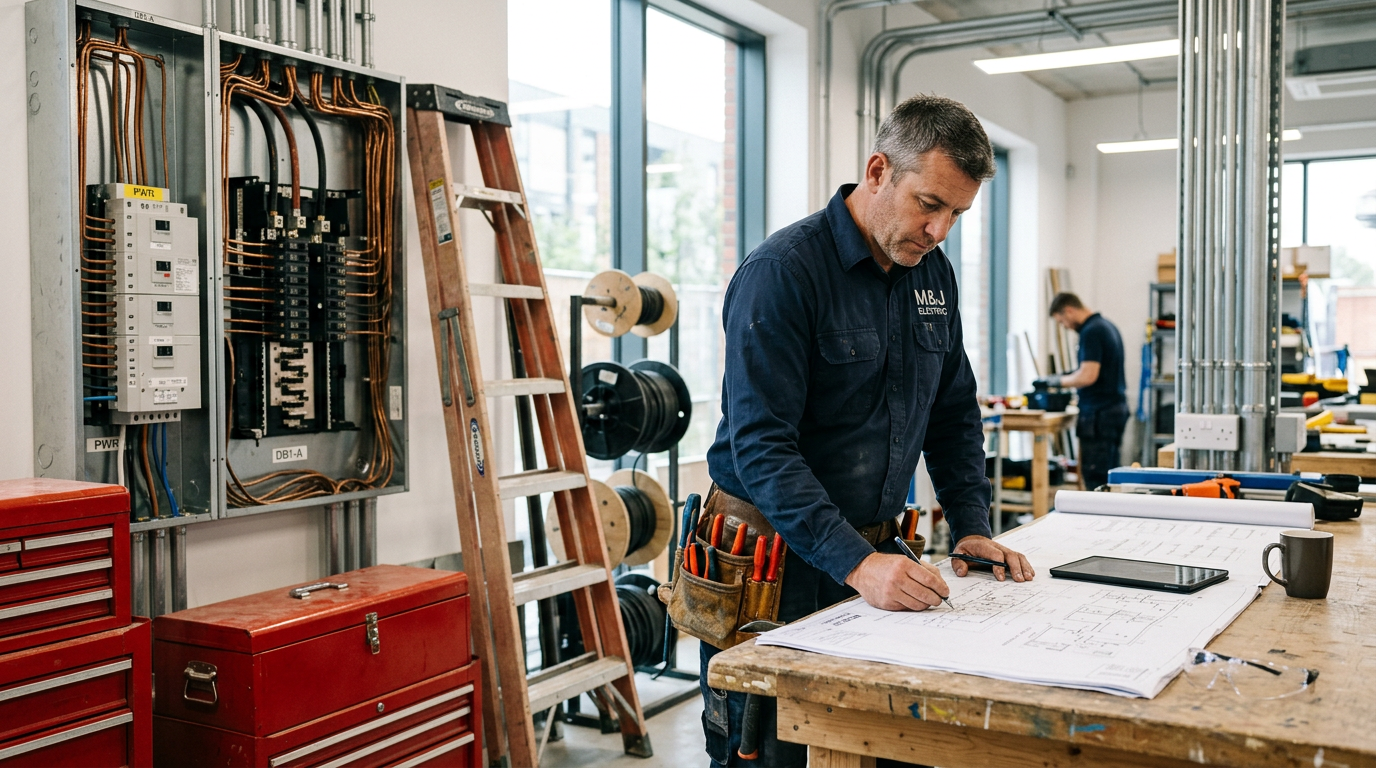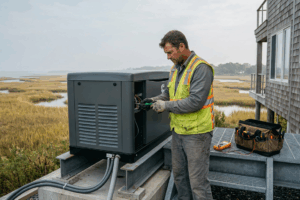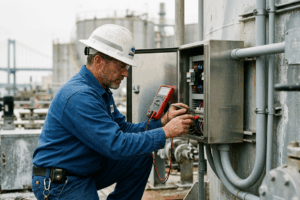
What is a C-10 License and Why Is It Crucial for Electricians?
This license is more than a piece of paper; it’s the legal foundation for building a scalable and profitable electrical contracting business in the Golden State. Whether your goal is to lead large commercial installations, specialize in residential wiring, or become a key player in the green energy revolution, understanding the C-10 license is the first step.
What Exactly Is a C-10 Electrical Contractor License?
A C-10 license is a specialty contractor’s license issued by the Contractors State License Board (CSLB) in California. According to the CSLB, a C-10 contractor is authorized to “place, install, erect or connect any electrical wires, fixtures, appliances, apparatus, raceways, conduits, solar photovoltaic cells or any part thereof, which generate, transmit, transform or utilize electrical energy in any form or for any purpose.” In simple terms, if you want to bid on and legally perform any electrical work on projects where the total cost of labor and materials is $500 or more, you must hold a C-10 license.
This classification gives you the authority to operate an independent business, hire other electricians, pull permits, and be the responsible party for a wide range of electrical projects.
C-10 License vs. Journeyman Electrician: Understanding the Leap
A common point of confusion is the difference between a state-certified journeyman electrician and a C-10 electrical contractor. The distinction is fundamental to your career path.
- Journeyman Electrician: A journeyman in California is an individual certified by the Department of Industrial Relations’ (DIR) Division of Apprenticeship Standards (DAS) to perform electrical work. They are skilled professionals who work as employees under the supervision of a C-10 contractor. A journeyman certification proves your skill as a tradesperson, but it does not allow you to contract for work independently.
- C-10 Electrical Contractor: A C-10 licensee is a business owner or an independent contractor. They bid on jobs, manage projects, employ journeyman electricians, and carry the legal and financial responsibility for the work performed. The C-10 license is what allows you to transition from being an employee to an employer.
Making the jump from journeyman to C-10 contractor is a significant step up, moving from performing the work to managing the business of electrical work.
Key Requirements for Obtaining a C-10 License
The CSLB has a clear set of requirements to ensure that only qualified professionals can become licensed contractors. To qualify, you will generally need to:
- Prove Your Experience: You must have at least four years of journey-level experience within the last ten years. This experience must be verified by a qualifying individual such as a former employer, a licensed contractor, or a supervisor who has direct knowledge of your work.
- Pass Two State Exams: Applicants must pass both the C-10 trade-specific electrical contractor exam and the law and business exam. These tests cover your knowledge of electrical theory, codes, and safety, as well as California’s business and contracting laws.
- Secure a Contractor Bond: You must file a $25,000 contractor bond with the CSLB. This bond serves as a form of financial protection for consumers and your employees.
- Obtain Insurance: You must show proof of workers’ compensation insurance if you have employees. If you are a sole owner with no employees, you are required to file an official Certificate of Exemption with the CSLB.
- Undergo a Background Check: All applicants must submit to a fingerprinting and criminal background check.
The Broad Scope of a C-10 License
The C-10 license provides a comprehensive scope of work, empowering you to take on a vast array of projects. This includes everything from basic residential wiring and service panel upgrades to complex commercial installations and industrial high-voltage systems. The license also covers the installation of solar photovoltaic cells, a rapidly growing sector in California.
How is it Different from a C-7 Low Voltage License?
It’s important not to confuse the C-10 with the C-7 low voltage license. The C-7 license is for contractors who work with systems that are 91 volts or less. This includes jobs like installing sound systems, satellite dishes, security alarms, and network cabling. While a C-10 contractor is permitted to perform low-voltage work, a C-7 contractor cannot legally perform work on systems over 91 volts. The C-10 is the more comprehensive license for a full-service electrical business.
Why a C-10 License Is Your Gateway to Growth
In California’s $42.1 billion electrical industry, holding a C-10 license is your ticket to significant financial and professional growth. The demand for qualified contractors is surging due to several key trends:
- The EV Revolution: California’s push for electric vehicles requires a massive build-out of residential and commercial charging stations, a market tailor-made for C-10 contractors.
- Electrification & Renewables: State-wide initiatives for decarbonization and renewable energy are driving unprecedented demand for electricians skilled in solar, energy storage, and modernizing electrical systems.
- Business Ownership and Higher Earnings: As a licensed contractor, you control your own projects, set your own rates, and build a business with unlimited earning potential, breaking free from the salary ceiling of an employee.
Staying Current with the National Electrical Code (NEC)
Passing your electrical contractor exam and earning your license is just the beginning. The electrical field is constantly evolving, and a deep understanding of the National Electrical Code (NEC) is essential for compliance, safety, and efficiency. The CSLB exams are based on the NEC, and staying current with its updates is critical for any successful contractor. For instance, understanding how NEC 2023 definition changes have impacted electrical work or how new equipment marking requirements have changed can directly affect your projects. Likewise, knowing the latest rules for using reconditioned electrical equipment can impact job costs and compliance.
Continuing education and online electrical courses are invaluable tools for keeping your knowledge sharp and your business competitive. If you’re ready to advance your skills and stay ahead of code changes, ExpertCE offers a full suite of courses designed for professionals like you. Browse our courses today to prepare for your next career move.
Frequently Asked Questions about the C-10 License
Do I need to go to an electrician school to get a C-10 license?
While formal attendance at an electrician school is not a mandatory CSLB requirement, it can be extremely beneficial. Education from a trade school or an apprenticeship program can count toward the four years of required experience and provide the foundational knowledge needed to pass the state exams.
Can I work as a residential electrician with only a C-10 license?
Yes. The C-10 license covers all forms of electrical work, including that of a residential electrician. You are fully authorized to contract for residential projects of any size, from simple repairs to complete home rewires.
What happens if I perform electrical work over $500 without a C-10 license?
Working without the required license in California carries severe penalties. This can include fines, misdemeanor charges, and the inability to use the legal system to collect payment for your work. The CSLB actively investigates and prosecutes unlicensed contracting to protect consumers.
Continuing Education by State
Select your state to view board-approved continuing education courses and requirements:
Disclaimer: The information provided in this educational content has been prepared with care to reflect current regulatory requirements for continuing education. However, licensing rules and regulations can vary by state and are subject to change. While we strive for accuracy, ExpertCE cannot guarantee that all details are complete or up to date at the time of reading. For the most current and authoritative information, always refer directly to your state’s official licensing board or regulatory agency.
NEC®, NFPA 70E®, NFPA 70®, and National Electrical Code® are registered trademarks of the National Fire Protection Association® (NFPA®)



